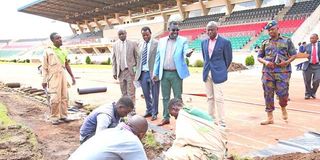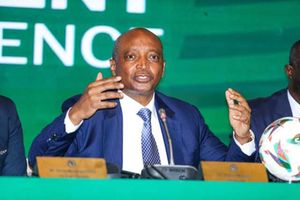
Sports Principal Secretary Peter Tum (in a sky blue coat), 2024 Chan Local Organising Committee (LOC) chairman Nicholas Musonye (left) and his CEO Mike Rabar during an inspection of the refurbishment of Nyayo National Stadium on November 23, 2024.
Yesterday morning, the Confederation of African Football (CAF) released the official tournament logo alongside the look and feel for this year’s African Nations Championship (CHAN).
A montage with the tournament’s trophy is the centerpiece around an orange-themed visual that celebrates Africa’s passion for the game. The promos and logos were unleashed just hours after CAF announced the postponement of the tournament initially earmarked for February 1-28 in Kenya, Uganda and Tanzania to dates to be confirmed in August.
The African football body emphasized inadequate preparations, sugarcoating their message that not all standards were met to actualize a flawless competition.
“The CAF Technical and Infrastructure experts some of whom have been based in Kenya, Tanzania and Uganda, have advised CAF that more time is required to ensure that the infrastructure and facilities, are at the levels, necessary for hosting a successful TotalEnergies African Nations Championship (“CHAN”) Kenya, Tanzania, Uganda 2024,” CAF said in a statement announcing the postponement of Tuesday evening.
The confederation’s President Patrice Motsepe equally hinted at the shortfalls.
“I am impressed with the ongoing construction and renovations of the football infrastructure and facilities in Kenya, Tanzania and Uganda.
“I am confident that the stadiums, training fields, hotels, hospitals and other infrastructure and facilities will be at the requisite CAF standards for hosting, in August 2025, a very successful TotalEnergies African Nations Championship (“CHAN”) Kenya, Tanzania, Uganda 2024,” the South African supremo observed.
Insiders in the CAF inspection team confided that the technical details, especially in Kenya and Tanzania, needed to be met while appreciating the great support they have received from the Kenyan government in fast-tracking preparations.
“We are extremely impressed by the government support and enthusiasm across, from the Head of State to the officials and public. Everyone here is excited to host the tournament,” the official, who was part of inspection tours across the three host nations noted, preferring anonymity as he is not authorized to issue statements.
“In Tanzania, there was a bit of a laid-back attitude and the enthusiasm wasn’t as much… there was generally no buzz. But we can’t complain about Uganda where we were largely impressed.”
The official’s comments echo those of CAF’s Director of Tournament and Events Samson Adamu who led an inspection tour of Kenya, Uganda and Tanzania last week.
The delegation also included CAF’s heads of technology, ticketing, marketing, infrastructure, safety and security, TV operations, media operations, pitch-management and digital operations.
“From the last time we were here, Kenya has made remarkable progress. It is the right pace of work and shows the commitment by the government and determination by Kenya to host Chan,” Adamu told Kenya’s LOC members.
Dar es salaam’s 60,000-seater Benjamin Mkapa National Stadium and Kampala’s 45,000 capacity Namboole Stadium have been lined up to host the matches alongside Nairobi’s Moi International Sports Centre, Kasarani (55,000) and Nyayo National Stadium (18,000). Zanzibar’s 15,000-seater Amaan Sports Complex is also one of the host venues.
Adamu had expressed CAF’s concerns during his inspection visit to Kenya.
“We are three weeks to the competition and we are not in a very comfortable position, to be honest, to host a successful competition,” he told the Kenyan hosts. “We need to triple the efforts and an abnormal amount of work needs to be done.”
Kenya Defence Forces technical teams have been assigned the supervisory role in the stadium renovations and are also in charge of the construction of a brand new, 60,000-seater Talanta Sports City which will be the marquee venue for the 2027 Africa Cup of nations finals.
The Nyayo National Stadium has largely remained on course with the designated training grounds at the Police Sacco Stadium and Ulinzi Sports Complex also impressing the CAF delegates.
There is some work still required at the Kasarani Annex training ground and also the Kirigiti Stadium in Kiambu County which lacks a standby generator and whose playing surface and general aesthetics require particular attention.
CAF had given the Kenyan organisers this week to have the Kasarani roof and seats ready and January 20 for the floodlights to be in working conditions.
The competition zone was listed as “70 per cent ready” while the media areas were largely on track and were expected to be operational by January 27, five days ahead of kick-off.
At the Nyayo National Stadium, the floodlights were expected to arrive this week from China with CAF also giving January 20th as the deadline for their installations with the construction of the masts already done with CAF’s floodlights consultant, Frenchman Benoit Boussuet keeping a close eye.
There are several yellow patches at the Nyayo playing surface which were to be eliminated by January 25, with the playing arena certified as “40 per cent ready” by last week and well on schedule to be in good health by the initially proposed February 1 kick-off date, under the supervision of British pitch consultant Dean Gilasbey.
Television operations were largely on cue, with the International Broadcast Command Centre scheduled to be set up at the Kasarani indoor gymnasium.
The other headache faced by CAF’s technology team, led by Egypt’s Mohamed Bakeer, was the integration of latest technology – including goal-line technology and the Video Assistant Referee (VAR) – at the Kasarani and Nyayo stadiums, venues constructed four decades ago and battling to keep up with the Joneses.
CAF’s ticketing manager, Jonathan Madelaine from France, and ticketing officer, Egypt’s Mariam El Ghannam, faced the headache of a late marketing campaign that would have affected ticket sales.
With seats at Nyayo and Kasarani yet to be numbered, the production of seat-specific tickets would have been reduced to a last-minute rush which, in turn, would have compromised spectator attendance.
In Uganda, Kyambogo University, Mandela Stadium Namboole, Kampala International School, Muteesa II Stadium, Kampala International School (KISU) and Ugandan Football Federation (FUFA) Kadiiba Training Facility were enlisted as the competition’s training facilities.
But this after a late switch that saw KISU brought on board late after concerns over Kyambogo’s preparedness.
There is also concern over the state of access roads around the Kadiiba facility.
In Tanzania, the Benjamin Mkapa Stadium and Zanzibar’s Amaan Sports Complex match venues alongside the four training venues are “97 per cent ready”, according to the Tanzanian government.









